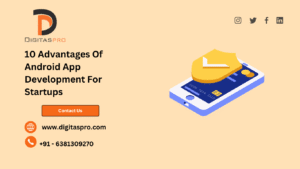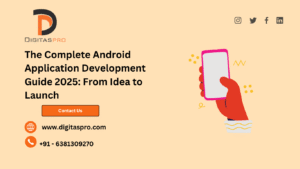Introduction
The Android app development landscape is evolving rapidly as new technologies, consumer behaviors, and market trends shape the future of mobile applications. With over 3 billion active Android devices globally, businesses and developers must stay ahead of the curve to create innovative and high-performing apps. In 2025, key trends such as AI-powered applications, 5G-enabled experiences, and cross-platform development will dominate the industry.
In this blog, we’ll explore the most significant Android app development trends for 2025 and how businesses can leverage them to stay competitive.
1. AI and Machine Learning Integration
Artificial Intelligence (AI) and Machine Learning (ML) continue to revolutionize Android applications. In 2025, AI-driven features such as chatbots, voice assistants, and predictive analytics will enhance user experience and engagement.
Key AI Trends in Android Apps:
- AI-Powered Chatbots & Virtual Assistants: AI-driven customer support will offer real-time assistance within apps.
- Personalized Content Recommendations: AI algorithms will analyze user preferences to provide tailored content, improving retention.
- Automated Image & Speech Recognition: Apps will leverage AI to provide better accessibility and security features.
- Predictive Text and Smart Reply: Enhancing communication apps with AI-driven suggestions.
2. 5G Technology and Enhanced Mobile Experiences
5G technology is set to redefine mobile app development by offering ultra-fast internet speeds and low latency. In 2025, more Android apps will leverage 5G for immersive experiences.
Benefits of 5G in Android Apps:
- Faster Load Times: Reduced buffering and instant access to high-quality content.
- Enhanced AR/VR Experiences: Augmented and virtual reality apps will become more seamless and responsive.
- Improved Cloud-Based Apps: Cloud gaming, remote collaboration, and streaming services will benefit from 5G connectivity.
- Higher Quality Video Streaming: 5G will enable real-time 4K and 8K video streaming without interruptions.
3. Cross-Platform Development with Flutter & Kotlin Multiplatform
Cross-platform development is becoming the preferred choice for businesses looking to reduce costs and time-to-market. Technologies like Flutter and Kotlin Multiplatform are making cross-platform development more efficient.
Why Flutter & Kotlin Multiplatform?
- Code Reusability: Developers can write once and deploy across Android and iOS.
- Faster Development Cycles: Reduced need for separate native coding.
- Improved Performance: Flutter and Kotlin offer near-native performance with smooth UI animations.
- Enhanced UI/UX Consistency: Single codebase ensures design consistency across platforms.
4. AR & VR-Enabled Applications
Augmented Reality (AR) and Virtual Reality (VR) are transforming industries such as e-commerce, healthcare, gaming, and education. Android apps will integrate AR/VR for better user engagement in 2025.
AR/VR Use Cases in Android Apps:
- Virtual Shopping & Try-On: AR-enabled shopping apps allow users to visualize products before purchasing.
- Immersive Gaming: VR-powered games will offer a more interactive experience.
- Remote Healthcare & Training: AR-driven medical training and remote patient consultations will increase.
- Interactive Learning: AR-enhanced educational apps will make learning more engaging.
5. Blockchain Technology for Security & Transparency
Blockchain is making its way into Android apps, ensuring secure transactions, data privacy, and decentralized applications (DApps).
Blockchain Applications in Android Apps:
- Secure Mobile Payments: Blockchain-powered apps will provide safer and faster transactions.
- Decentralized Apps (DApps): Eliminating intermediaries for better efficiency.
- Enhanced Data Security: Protection against data breaches and cyber threats.
- Transparent Supply Chain Management: Tracking product authenticity and transactions in real-time.
6. Internet of Things (IoT) Integration
The Internet of Things (IoT) is enhancing connectivity across smart devices. In 2025, Android apps will integrate IoT for smart home automation, healthcare monitoring, and industrial automation.
IoT-Based Android App Innovations:
- Smart Home Control Apps: Users can control lights, appliances, and security systems via mobile apps.
- Healthcare & Fitness Apps: IoT-enabled wearables will monitor real-time health data.
- Connected Cars: IoT will power smart vehicle navigation, diagnostics, and entertainment.
- Industrial Automation: Businesses will use IoT-powered Android apps for monitoring logistics and operations.
7. On-Demand Apps for Enhanced User Convenience
On-demand services continue to gain traction across industries such as food delivery, transportation, and healthcare. In 2025, we will see further improvements in app efficiency and AI-driven customization.
Popular On-Demand App Categories:
- Ride-Sharing & Food Delivery: AI-powered recommendations and faster delivery tracking.
- Healthcare & Telemedicine: Instant doctor consultations and medicine delivery apps.
- Freelance & Gig Economy Platforms: AI-driven job matching for freelancers.
- Personalized E-Commerce & Subscription Services: AI-driven shopping experiences.
8. Progressive Web Apps (PWAs) for Faster Performance
Progressive Web Apps (PWAs) provide a seamless app-like experience without requiring downloads. In 2025, businesses will increasingly adopt PWAs to reach wider audiences without the constraints of app stores.
Benefits of PWAs:
- Faster Load Times & Better Performance
- Offline Functionality with Service Workers
- Lower Development Costs Compared to Native Apps
- Improved User Engagement with Push Notifications
9. Wearable App Development
With the rise of smartwatches and fitness bands, wearable app development is expanding in 2025. Google’s Wear OS updates will further enhance Android app functionalities for wearables.
Wearable App Innovations:
- Health & Fitness Tracking
- Contactless Payments via Smartwatches
- Voice Assistant Integration
- Real-Time Messaging & Notifications
10. Sustainability & Green App Development
Eco-friendly and sustainable app development is a growing trend in 2025. Developers are focusing on reducing app energy consumption and optimizing performance.
Green App Development Strategies:
- Energy-Efficient Code Optimization
- Dark Mode & Battery-Saving Features
- Cloud-Based Data Storage for Reduced Carbon Footprint
- Recycling & Environmental Awareness Apps
Conclusion
The Android app development industry in 2025 is set to be driven by AI, 5G, AR/VR, IoT, and blockchain technologies. Businesses and developers must embrace these innovations to create smarter, faster, and more secure applications. Whether through AI-driven personalization, immersive AR/VR experiences, or sustainable app development, staying ahead of these trends will be crucial for success.
At DigitasPro Technologies, we specialize in cutting-edge Android app development solutions tailored to your business needs. Contact us today to build the next-generation mobile app that keeps you ahead in the digital race!
Are you ready for the future of Android app development? Let’s innovate together!



